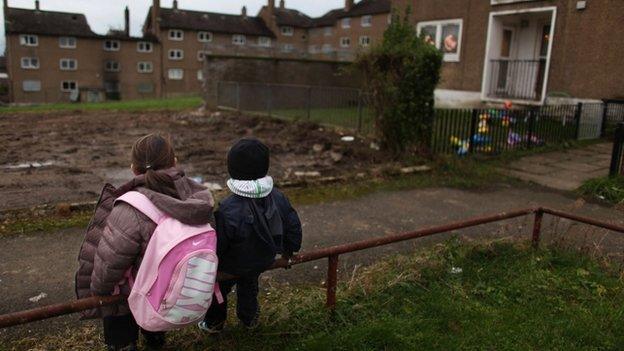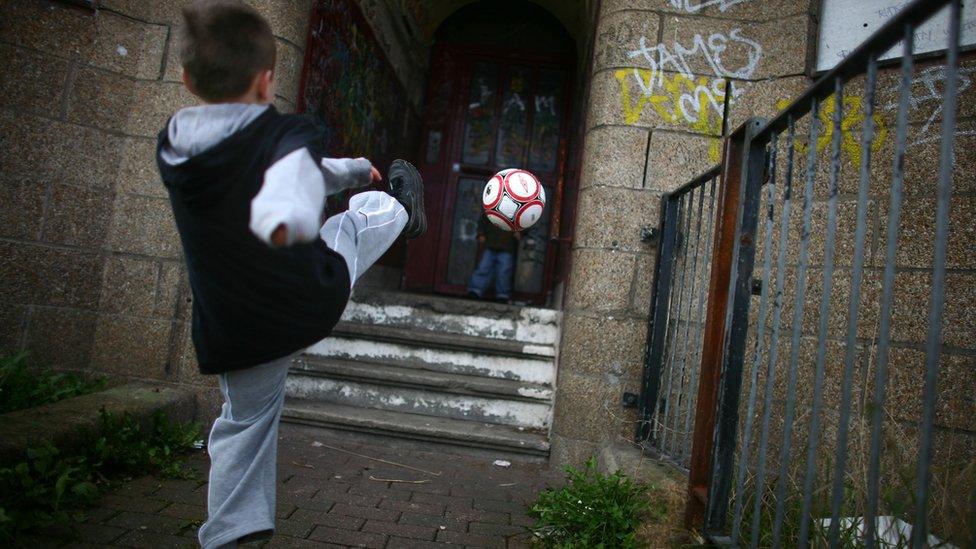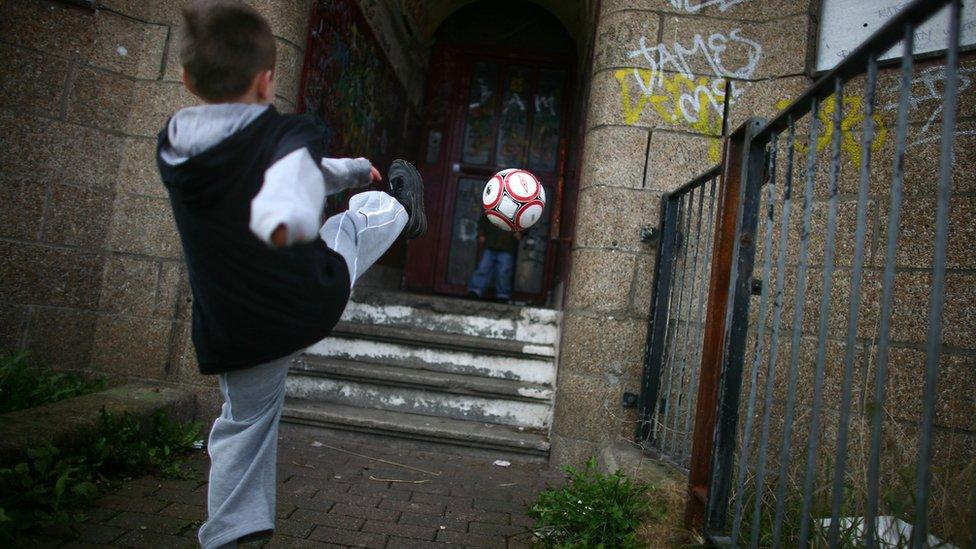More than 200,000 children growing up 'in poverty'
- Published

More than 200,000 children are growing up in poverty in Scotland, a new study has suggested.
The survey for the End Child Poverty coalition suggested that 3.5 million children are living in poverty in the UK - with 220,000 of them in Scotland.
The worst-hit local authority area in Scotland is Glasgow, where 34.1% of children are affected.
The Shetland Islands (10.6%), Aberdeenshire (13.1%) and Orkney (14.1%) are the least affected.
According to the Child Poverty Action Group, which assessed benefit data, about 23% of children in Scotland live in low income households. That figure is up from 19% five years ago.
Campaigners have called on the chancellor to use the upcoming Autumn Statement to end the freeze on children's benefits, and reverse the cuts being introduced to in-work benefits under Universal Credit.
The coalition, which is made up of the Child Poverty Action Group, Barnardo's Scotland, One Parent Families Scotland, Children 1st and the Poverty Alliance, also wants the Scottish government to ensure the proposed Child Poverty (Scotland) Bill addresses poverty at local level.
John Dickie, director of Child Poverty Action Group in Scotland, said: "There's no doubt that many of the key drivers of child poverty are UK-wide and if the new prime minister is serious about supporting families then decisive action must be taken to end the freeze on children's benefits and reverse sharp cuts to in-work support under Universal Credit.
"But this new map also makes it clear that child poverty plays out in different ways at local level. Local authorities and their partners know their communities and are in a great position to work with local people to prevent poverty.
"Many are already doing important work to make sure local childcare, housing and employability policies are working for low-income families.
"The new Scottish child poverty legislation must now be drafted to ensure all local authorities are supported in law to take a strategic approach, and that all levels of government are pulling in the same direction - towards a Scotland free from child poverty."

Peter Kelly, director of the Poverty Alliance, added: "Poverty in Scotland continues to harm the lives of children across Scotland, as this new map shows.
"Living on a low income not only affects their well-being now, but can have a negative impact in the future.
"This is an unnecessary situation and one that requires urgent attention."
'Work pays'
A spokeswoman for the UK government's department of work and pensions said welfare changes had "incentivised work" and were "restoring fairness to the benefits system."
She added: "The number of people in relative low income has fallen by 300,000 since 2010 and we are going further to help the most disadvantaged with a focus on tackling the root causes - not just the symptoms - of poverty.
"Work is the best route out of poverty. The number of children living in working households is at a record high and by increasing the National Living Wage and taking millions of people out of paying any income tax, we are ensuring it always pays to be in work."
The Scottish government's Communities Secretary Angela Constance blamed UK government policy for the figures.
She said: "The UK government's continued welfare cuts alongside benefit sanctions and delays are consistently pushing people into crisis situations and while we are already spending £100m a year mitigating cuts inflicted by the UK government, this money would be better spent on eradicating child poverty."
She said the Scottish government was determined to end child poverty by 2030.
'Epidemic of hunger'
She added: "Our other actions include a new Best Start Grant which will support low income families with children in the early years, and we will double the entitlement to early learning and childcare for all three and four-year-olds, as well as those two-year-olds that stand to benefit the most."
A separate study has revealed that 63,794 three-day supplies of emergency food were handed out to people in Scotland at Trussell Trust foodbanks.
The figures showed that problems with benefits remain the most significant reason for foodbank use, accounting for a total of 42% of referrals.
A quarter of cases were due to benefit delays and nearly a fifth were sparked by benefit changes.
The trust's Scotland network manager, Ewan Gurr, said: "The figures offer a mixed prospectus regarding the extent of foodbank use across Scotland.
"On one hand, we are still experiencing an epidemic of hunger in Scotland. Benefit delays and changes are still the primary reasons underpinning the increased number of referrals to foodbanks.
"What is more concerning, however, is that hunger is also clearly and consistently being driven by low income.
"A decrease in the cash in people's pockets leads to an increase in the use of foodbanks."
Scottish Labour's deputy leader Alex Rowley said: "This research shows that one in three children in Scotland grow up in poverty in some parts of Scotland.
"It is clear that the Tory reforms to welfare are not working and are directly leading to more children in Scotland being in poverty."
He called on Scottish Conservative leader Ruth Davidson "to bring to an end to these unfair, unjust and unworkable reforms of welfare and instead invest in Scotland's greatest asset, our people."
He added: "But it is also time for the SNP government in Edinburgh to drop the excuses and use the powers of the Scottish Parliament to help tackle child poverty head on."
- Published7 November 2016
